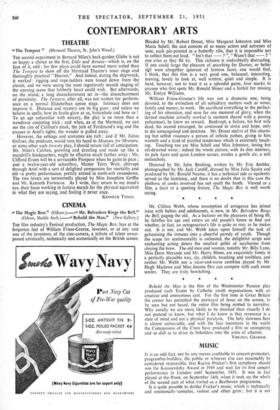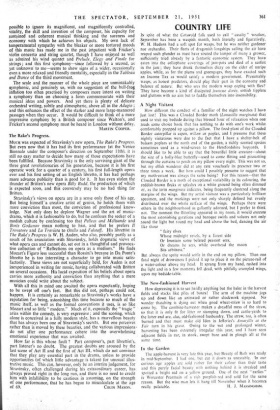MUSIC
IT is an odd fact, not by any means creditable to concert-promoters, programine-builcters, the public or whoever else can reasonably be considered responsible, that Racine Fricker's first symphony should win the Koussevitzky Award in 1949 and wait for its first concert performance in London until September, 1951. It was in fact played at the Prom. on September 14th, when it took up the whole of the second part of what earted as a Beethoven programme. It is quite possible to dislike Fricker's music, which is technically and emotionallyocomplex, violent and often grim ; but it is not
possible to ignore its magnificent, and magnificently controlled, vitality, the skill and invention of the composer, his capacity for sustained and • coherent musical thinking and the sureness and economy with which he achieves his objects. My own lack of temperamental sympathy with the bleaker or more tortured moods of this music has made me in the past irtipatient with Fricker's violin concerto and string quartet, though I have enjoyed as well as admired his wind quintet and Prelude, Elegy and Finale for strings ; and this first symphony—since followed by a second, as yet unknown' to me—seems to show signs of a wider, occasionally even a more relaxed and friendly mentality, especially in the Tableau and Dance of the third movement.
The scale and the manner of the whole piece are unmistakably symphonic, and genuinely so, with no suggestion of the bull-frog inflation too often practised by composers more intent on writing a symphony than on choosing a form commensurate with their musical ideas and powers. And yet there is plenty of delicate orchestral writing, subtle and atmospheric, above all in the Adagio ; and this enhances the effect of the starker and more large-mannered passages when they occur. It would be difficult to think of a more impressive symphony by a British composer since Walton's, and Fricker's second symphony must be heard in London without delay.
MARTIN COOPER.



































 Previous page
Previous page